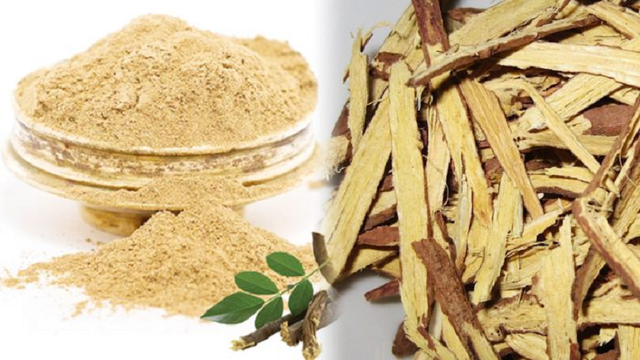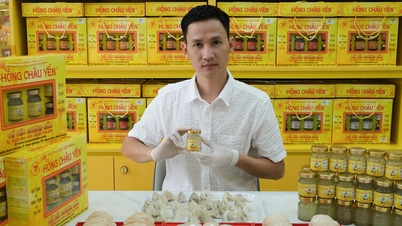Expectorants are substances that add moisture to mucus, making the mucus less sticky and easier to cough up, helping to clear phlegm or mucus from the respiratory tract (airways).
1. How do expectorants work?
Expectorants, although a class of drugs used to treat coughs, do not suppress coughs but help prevent mucus from building up in the respiratory system. This is important because coughing up mucus is the body's way of removing microorganisms, foreign objects, and excess mucus from the airways.
Expectorants are also used as a supportive treatment along with other medications to help treat coughs. In addition to medications, some natural remedies can help loosen phlegm.
 |
| Licorice contains chemicals that can thin mucus, help loosen phlegm, and reduce coughs. |
2. Some natural remedies to help loosen phlegm
- Water: Water increases the moisture in mucus, making it easier to expel. You can use water as an expectorant by drinking plenty of water or using it as an herbal tea.
You can also gargle with salt water, use a humidifier or inhale steam... to get similar effects.
Honey: Honey has long been used to relieve coughs and congestion, with studies proving it to be an effective expectorant. To use honey as an expectorant, dissolve a tablespoon of honey in a cup of warm water. Drink the mixture throughout the day. However, do not give honey to children under 1 year of age.
- Ginger: Widely used as medicine and food. Ginger relieves congestion and acts as an expectorant. To use, crush the ginger root and boil it in water for a few minutes and sip the drink throughout the day.
However, it's important to note that ginger should not be used if you are taking blood-thinning medications. Ginger lowers blood pressure in high doses, so avoid it if you are taking blood-thinning medications.
- Garlic: Garlic has many uses and is grown all over the world . It contains a chemical called allicin, which has medicinal properties. Garlic can help relieve a cough if you crush it and put it in hot water for steam inhalation. You can also crush garlic, mix it with honey and take a spoonful, three times a day. However, avoid consuming garlic if you are taking anticoagulants.
- Basil: Is an herb that helps thin mucus. To use, boil about 10 basil leaves with 5 cloves in a cup of water for 10 minutes. Let the mixture cool and drink three times a day. You can also add a few drops of basil oil to boiling water and use it for steam inhalation.
However, you should avoid using basil if you are pregnant, planning to become pregnant, or if you have diabetes or hypothyroidism.
- Licorice: Licorice is an herb native to parts of Europe and Asia. It contains chemicals that can thin mucus secretions and reduce the incidence of sore throats after certain surgical procedures.
Add half a teaspoon of licorice to a cup of water and boil for 10 minutes, then drink this tea. You can also add half a teaspoon of licorice to a cup of warm water and gargle three times a day or eat licorice candy.
However, make sure you avoid using licorice if you have high blood pressure.
- Peppermint: Peppermint contains menthol, which can relieve symptoms of throat and chest infections. Peppermint oil is also an antispasmodic – it eases or reduces muscle spasms in the respiratory tract.
To use peppermint as an expectorant, add a drop of peppermint oil to hot water and inhale the steam. You can also drink peppermint tea, but remember that peppermint can cause heartburn and vomiting. Peppermint essential oil can be toxic to children and pregnant women.
- Eucalyptus oil: Eucalyptus is used in many cough drops, inhalers, and sprays to loosen mucus and relieve nasal congestion. You can use it by adding two drops of eucalyptus oil to water and using it for steam inhalation. However, eucalyptus oil is toxic when consumed orally./.
According to suckhoedoisong.vn
Source link




![[Photo] Cat Ba - Green island paradise](/_next/image?url=https%3A%2F%2Fvphoto.vietnam.vn%2Fthumb%2F1200x675%2Fvietnam%2Fresource%2FIMAGE%2F2025%2F12%2F04%2F1764821844074_ndo_br_1-dcbthienduongxanh638-jpg.webp&w=3840&q=75)












































![[VIMC 40 days of lightning speed] Hai Phong Port determined to break through, reaching the target of 2 million TEUs by 2025](https://vphoto.vietnam.vn/thumb/402x226/vietnam/resource/IMAGE/2025/12/04/1764816441820_chp_4-12-25.jpeg)
























































Comment (0)